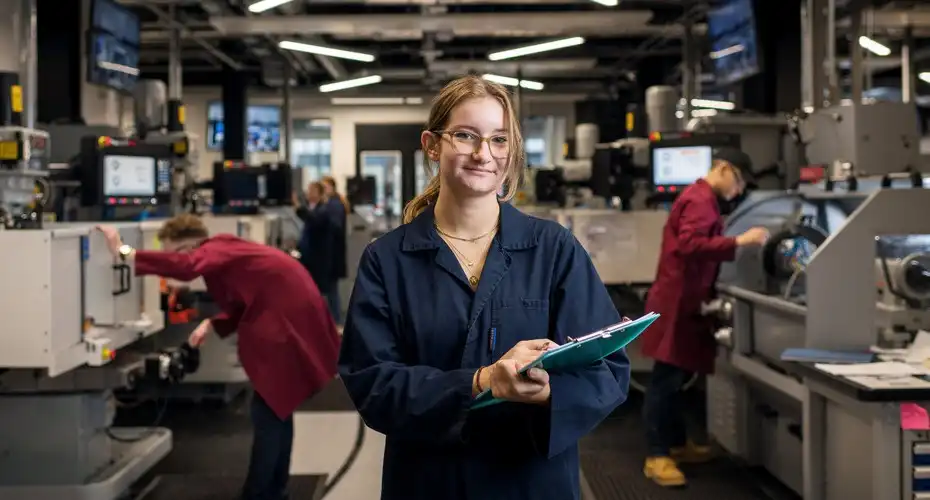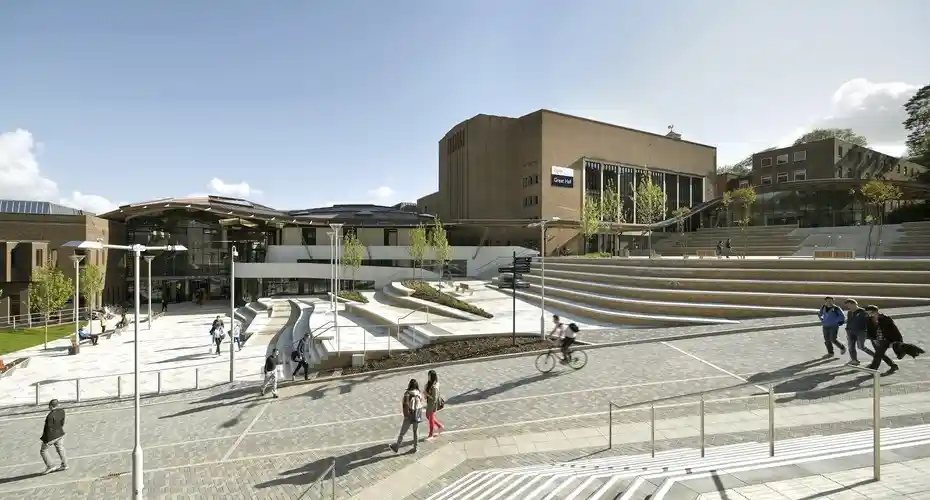| Degrees |
|
|---|---|
| Duration |
| Start date | September, January or April |
|---|---|
| Locations | Streatham Campus
Penryn Campus |
| Study modes | Full time or part time |
Overview
Our research is organised into nine distinct research themes:
- Biochemistry and Molecular Microbiology
- Cell and Developmental Biology
- Disease Ecology and Evolution
- Ecosystems
- Environmental Biology
- Marine Ecology
- Medical Mycology
- Microbial Evolutionary Ecology
- Plant and Algal Biology
Contact
Web: Enquire online
Phone: 0300 555 6060 (UK)
+44 (0)1392 723044 (non-UK)
![]()
Top 20 in the UK for world-leading research in Biological Sciences
REF 2021, based on 4-star research
![]()
Advanced laboratory skills with specialist techniques training
![]()
World-leading research groups
Accredited by AMBA, EQUIS and AACSB
![]()
Top 20 in the UK for world-leading research in Biological Sciences
REF 2021, based on 4-star research
![]()
Advanced laboratory skills with specialist techniques training
![]()
World-leading research groups
Accredited by AMBA, EQUIS and AACSB
Research overview
Our location in the South West enables us to undertake a wide range of biological science research, from cell and molecular biology, microbiology and biochemistry through to evolutionary, environmental, ecological and conservation studies. Our research groups reflect the interests and expertise of our staff, ensuring that we are able to optimise the knowledge of our academic experts.
Research at our Streatham Campus spans all scales of biological organisation, from molecules to global ecosystems, and we actively foster interdisciplinary research across the University and beyond. We pride ourselves on seamlessly bridging fundamental and applied research, aided by our physical linkage to the £52M Living Systems Institute and the recently-established BioEconomy Centre.
Our research is organised into nine distinct research themes:
Here you have the opportunity to study at the Centre for Ecology and Conservation, which has more than 50 academic staff, creating a vibrant and internationally research-active environment focused on whole-organism biology, with leading research in:
- Behavioural Ecology
- Disease Ecology and Evolution
- Ecosystems
- Insect Evolutionary Ecology
- Marine Ecology
- Microbial Evolutionary Ecology
The Centre has a thriving and dynamic population of postdoctoral researchers and MbyRes, MPhil and PhD students, funded by research councils, industry and charities, studying a diverse range of topics and working at sites around the UK and around the world, recently including:
- South Africa
- Gabon
- the Cayman Islands
- Cyprus
- Australia
- the Arctic
- Indonesia
- India
- China
- Kenya
- Uganda
The Penryn Campus is also the home of the Environment and Sustainability Institute (ESI).
How to apply
Entry requirements
Applicants will typically hold (or be expected to attain) a First Class or Upper Second Class degree in biology or a related subject (or equivalent qualifications from other countries). However, specific requirements may vary and prospective applicants should contact the team via our enquiry form, or by calling +44 (0)1392 723310.
Start date
You can start in September, January or April but we strongly encourage a you to enrol in Term 1 in September as induction events are focused around this start date. However, we do permit MSc by Research/MPhil/PhD students to enrol either at the start of Term 1, Term 2 or Term 3 (see University term dates), or on the 1st of any other month except August, September and October.
Requirements for international students
If you are an international student, please visit our international equivalency pages to enable you to see if your existing academic qualifications meet our entry requirements.
English language requirements
International students need to show they have the required level of English language to study this course. The required test scores for this course fall under Profile B2: view the required test scores and equivalencies from your country.
PhD and Research Programme application process
The information below applies to self-funded PhD, MPhil and Masters by Research applicants, but if you are applying for a funded PhD studentship, please follow the specific instructions related to that application.
- Pinpoint your PhD research area
- Investigate whether this area is available at Exeter
- Ensure that you meet our English language entry requirements (international students only)
- Construct and refine your PhD research proposal
- Approach your potential supervisor(s)
- Apply online
PhD studentships pages can be accessed in our Funding lists on Finance tabs under each research topic page, and are also available from the Postgraduate Research search results pages on this site, on the PhD projects tab.
Full details of the application process can be found on our Apply now webpage.
Fees and funding
Tuition fees per year 2025/26
- Home: £5,022 full-time; £pro-rata part-time
- International: £28,600 full-time
For those studying for more than one year, our fees are expected to increase modestly in line with Consumer Price Inflation measured in December each year. More information can be found on our Student Finance webpages.
Tuition fees per year 2026/27
- Home: £TBA full-time; £pro-rata part-time
- International: £28,900 full-time
For those studying for more than one year, our fees are expected to increase modestly in line with Consumer Price Inflation measured in December each year. More information can be found on our Student Finance webpages.
Our Postgraduate Funding webpage provides links to further information. If you are considering a PhD in the future, in addition to University of Exeter funding, we have been successful at securing postgraduate funding for PhD research through our Funded centres.
Current available funding
Supervision
You can expect:
- High-quality research supervision to develop and nurture your scientific potential
- A tailored supervision approach to help best suit your requirements
- Accessible supervisors who are enthusiastic about working directly with postgraduate research students
- Regular timetabled meetings with your supervisor
- 'Open door' policy to all postgraduate students - instant access to world-leading researchers who will share their expertise and ideas with you
- Regular meetings with your supervisory team, other members of your research group, and mentors
› Biological Sciences staff profiles (select your area of interest and find a supervisor)
› Natural Sciences - Find a supervisor
You will only be able to pursue a research degree with us if we can offer appropriate supervision. Your supervisors will provide the necessary support and guidance and so need to have expertise in your chosen research field. You may join a research team or work with specific members of staff.
We strongly recommend that you informally approach your potential supervisor(s) with your research proposal before submitting a formal application to study. This will enable you to find out if they feel they would be able to supervise you and whether they believe your research proposal needs further refinement.
Visit our how to apply page for detailed information on the application process.
Training
Opportunities to teach
All of our research students are given the opportunity to get involved in some form of teaching:
- Designing and giving demonstrations in the laboratories
- Working with academics to design practicals and exercises
- Giving lectures
Postgraduate training and support
We are committed to ensuring that our research students are given the training and support to develop high-level professional skills required for careers in academia, commercial or public sectors.
On our Penryn Campus, there are several training options open to our students:
- Grant and fellowship application workshops
- Intensive programmes highlighting ways in which to help get scientific literature published
- Training in statistical programming
Find out more about the options available to research students:
- Research Opportunities and Careers
- Researcher Development Programme (training and development events exclusively designed for our Masters by Research and PhD students)
Exeter (Streatham Campus)
There are a wide range of training opportunities available to PhD and taught Masters students including:
- Universal transferable skills and research specific training
- Yearly events, workshops and sessions that cover transferable skills and research specific training, including quantitative biology and statistics, demonstrator training and various aspects of safety
- Research seminars featuring internal and external speakers are organised each week during term time
- Specific training associated with microbiology techniques, the use of radioisotopes and genetically modified organisms are provided for students expecting to use these techniques
- Additional optional courses, graduate schools and conferences arranged with supervisors on an individual basis
In addition, you will be encouraged to participate in the University's Researcher Development Programme. This offers training in a wide range of generic and transferable skills in key areas such as research management, personal effectiveness, communication skills, networking, teamworking, and career management.
Penryn Campus, Cornwall
There are a wide range of training opportunities available to MPhil/PhD students including:
- Universal transferable skills and research specific training provided by Biosciences staff, or colleagues from the University’s Researcher Development Programme.
- Yearly events, workshops and targeted sessions including quantitative biology and statistics, demonstrator training and various aspects of safety, research management, personal effectiveness, communication skills, networking, teamworking, and career management.
- Weekly (term time) research seminars featuring internal and external speakers
- Additional optional courses, graduate schools and conferences arranged with supervisors on an individual basis
Careers
We are committed to ensuring you receive high quality research supervision to maximise your scientific potential and prepare you for a rewarding future, whatever your chosen career path.
While many of our research degree graduates choose to continue their scientific research, others have embarked on careers in a variety of other sectors.
Some of our Masters by Research graduates have progressed to further study, but many have sought employment on graduation.
Graduate destinations
Some examples of recent destinations of our research students are listed here. This information has been taken from the Destinations of Leavers from Higher Education (DLHE) Survey 2016/17
Please note that, due to data protection, the job titles and organisations are listed independently and do not necessarily correspond.
| Job Title | Organisation |
|---|---|
| Marine Biologist Applied Insect Science Environmental Scientist Post Doc Research Fellow Postdoctoral researcher Support Consultant Principal Information Analyst Post Doc Research Scientist Field Ecologist Assistant Statistician Formula 1 Trackside Analyst Computational Ecologist Conservation officer |
Isca Diagnostics Ltd Aspen Tech The Centre for Ecology and Hydrology AstraZeneca, UK Charles University Shell Food and Environment Research Agency HMRC Study Director Best Dives Maldives NHS University of Exeter Zoological Society of London Weizmann Institute of Science Whitley Wildlife Conservation Officer |
Facilities
Facilities at Exeter
Biosciences in Exeter is based in three buildings:
- Geoffrey Pope
- the Henry Wellcome building for Biocatalysis
- Hatherly
It is also supported by purpose-built greenhouse facilities.
The Geoffrey Pope building recently underwent a £25m refurbishment, and now includes:
- 4,817 m2 of lab space, much of which is configured as BSL2/GM2 laboratories
- Four controlled environment growth rooms
- A bioimaging suite offering state-of-the-art light microscopy
- A mass spectrometry facility
- the Exeter Sequencing Service, providing genomics and bioinformatics analysis
- A £9m state-of-the-art aquaria complex featuring:
- 14 aquaria rooms housing 600 experimental tanks and seven preparative and analytical labs
- seven preparation and laboratory rooms that contain specialist microscopes, cameras, and video and imaging equipment
- a Wolfson Foundation funded imaging unit, used principally for studies on embryogenesis
Facilities at Penryn
We have state-of-the-art research facilities to create a stimulating environment in which to undertake an MPhil/PhD. Our Penryn Campus is home to the £30 million Environment and Sustainability Institute (ESI). Our laboratories are fully equipped with the needs of a modern laboratory and are complemented with state of the art cold rooms and numerous temperature and light controlled incubators, enabling rearing of model and non-model organisms for study. Our facilities include:
- Controlled environment rooms: 13 large programmable environment rooms (including 8 in the ESI) with variable temperature and light regimes and shelving for insect rearing and plant growth applications
- Greenhouses: 2 large fully programmable greenhouses with automated blinds and lighting systems and full racking for plant and insect rearing
- Aviary: this Home Office approved facility is for breeding and observational studies of small birds
- 100 tank freshwater aquarium
- Molecular biology laboratories, including Category 2 microbiology/molecular biology laboratory, Class 2 tissue culture room, radioactive area licensed for a range of radioactive procedures, dark room/microscope rooms for light sensitive work and fluorescent microscopy, protein purification and proteomics equipment including HPLC and 2D SDS PAGE analysis, quantitative PCR machines and DNA preparation robot for preparation of DNA from BAC libraries and DNA capillary sequencer for DNA sequencing and DNA fragment analysis
- Metabolomics laboratory, dedicated to HPLC, Gas Chromatography and mass spectrometry
- Stable Isotope facility - the Sercon facility has two isotope ratio mass spectrometers with elemental analysers allowing the dedicated technician to measure Carbon Nitrogen, Sulphur, Oxygen, and Hydrogen ratios.
Student stories
PhD student Daisy talks about her research into microplastics in wastewater treatment works.
PhD student Kathryn talks about her research looking into the mating behaviours of swordtail fish.
PhD student Chrisna from Namibia talks about the risk of pharmaceuticals in the environment to fish.
Learning and assessment
The MbyRes, MPhil and PhD programmes give you the flexibility to shape your own research in an area of particular interest to you. Like other research degrees you will be required to work independently, but with the support and guidance of an appropriate supervisor.
We are committed to ensuring that our research students are given the training and support to develop high-level professional skills required for careers in academia, commercial or public sectors.
A wide range of training is available to postgraduate students, including traditional, transferable skills and research specific training. This is either provided by Biosciences staff, or by colleagues from the University's Researcher Development Programme, which offers an extensive choice of training and development events exclusively designed for our postgraduate students.
There are a number of events, workshops and sessions available every year. These include quantitative biology and statistics, demonstrator training and various aspects of safety, research management, personal effectiveness, communication skills, networking, teamworking, and career management. Research seminars featuring internal and external speakers are organised each week during term time. You will be encouraged to attend additional optional courses, graduate schools and conferences and these are arranged through discussion with supervisors on an individual basis.
MbyRes Assessment
You will be assessed by a written thesis or scientific paper of up to 40,000 words in length.
Candidates may be required to take a viva voce examination.
MPhil/PhD Assessment
All MPhil/PhD students enter onto an MPhil degree and undergo an upgrade to the full PhD typically during the first year of study. This upgrade typically involves a written progress report assessed by an internal viva with academics from within the department. For students who successfully upgrade to PhD, the PhD is assessed by a thesis of up to 100,000 words and a viva voce examination. For students who remain on the MPhil, the MPhil is assessed by a thesis of up to 60,000 words, and candidates may be required to take a viva voce examination.











